 Petzlover
Petzlover Both Rottweiler and German Shorthaired Pointer are originated from Germany. Rottweiler may grow 6 cm / 3 inches higher than German Shorthaired Pointer. Rottweiler may weigh 28 kg / 62 pounds more than German Shorthaired Pointer. Rottweiler may live 3 years less than German Shorthaired Pointer. Both Rottweiler and German Shorthaired Pointer has same litter size. Both Rottweiler and German Shorthaired Pointer requires Low Maintenance.
Both Rottweiler and German Shorthaired Pointer are originated from Germany. Rottweiler may grow 6 cm / 3 inches higher than German Shorthaired Pointer. Rottweiler may weigh 28 kg / 62 pounds more than German Shorthaired Pointer. Rottweiler may live 3 years less than German Shorthaired Pointer. Both Rottweiler and German Shorthaired Pointer has same litter size. Both Rottweiler and German Shorthaired Pointer requires Low Maintenance.
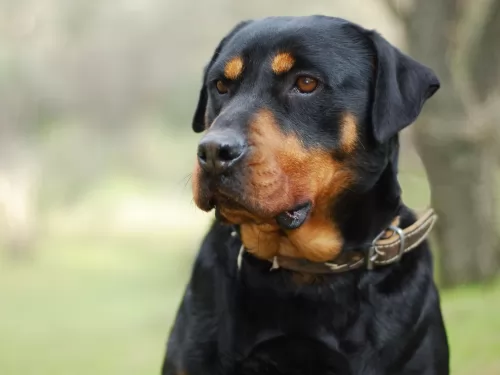 It is beleived to be the Rottweiler has been developed from the Roman cattle dogs. The Roman empire made a camp in a place at Germany in 74 AD. The area was called as 'das Rote Wil' and later as 'Rottweil'. In the middle ages Rottweiler was used in bear hunting and as a cattle dog. In 1899 the International club for Leonbergers and Rottweiler dogs was formed in Germany. In 19th century due to set in of railways the cattle was moved by railways and the need for the breed declined. When the world war was set in there came a heavy demand for police dogs. Rottweilers played a major role in first and second world war.
It is beleived to be the Rottweiler has been developed from the Roman cattle dogs. The Roman empire made a camp in a place at Germany in 74 AD. The area was called as 'das Rote Wil' and later as 'Rottweil'. In the middle ages Rottweiler was used in bear hunting and as a cattle dog. In 1899 the International club for Leonbergers and Rottweiler dogs was formed in Germany. In 19th century due to set in of railways the cattle was moved by railways and the need for the breed declined. When the world war was set in there came a heavy demand for police dogs. Rottweilers played a major role in first and second world war.
In 1921 many German Rottweiler clubs joined together to form ADRK, which is Allgemeiner Deutscher Rottweiler Klub. This is said to be the home club of Rottweiler. American kennel club recognised them in 1931. They become 9th most popular breed in America in 2013.
 Being a member of the Sporting Group, the German Shorthaired Pointer is a dog which was developed in the 19th century in Germany, and specifically for hunting. Hunters wanted a dog who could hunt all types of game and in all types of terrain.
Being a member of the Sporting Group, the German Shorthaired Pointer is a dog which was developed in the 19th century in Germany, and specifically for hunting. Hunters wanted a dog who could hunt all types of game and in all types of terrain.
There are quite a few different theories that exist regarding the origin of the German Shorthaired Pointer, but most experts believe that the breed came from a mix of old Spanish pointer and traditional continental pointers with further crossings of German Bloodhound and French Gascon to enhance scenting abilities.
The dogs popularity flourished in Europe and in 1891 the Klub Kurzhaar was founded to maintain the guidelines for this new and beautiful sporting dog.
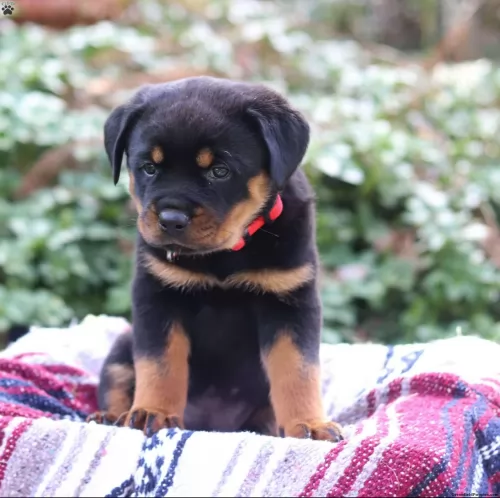 Rottweilers are good natured, obedient and are very much eager to work. They are calm, confident and an excellent watchdog. They will not make friends immediately. Rottweilers can be said as an all purpose dog since they are suitable as companion and watch dog as well. He is good in herding and guarding as genital feature. Rottweiler must be trained from its younger stage and should not be hit while training. They have high energy level and thus they are interested in doing work if properly trained. There are more possibilities of biting the strangers because of watchdog tendency.
Rottweilers are good natured, obedient and are very much eager to work. They are calm, confident and an excellent watchdog. They will not make friends immediately. Rottweilers can be said as an all purpose dog since they are suitable as companion and watch dog as well. He is good in herding and guarding as genital feature. Rottweiler must be trained from its younger stage and should not be hit while training. They have high energy level and thus they are interested in doing work if properly trained. There are more possibilities of biting the strangers because of watchdog tendency.
They are very good in herding sheeps as they have a natural gathering style. They are clever and adjusts the barking sound according to the situation. While herding they used to prove the leadership by selecting the dominant one in the flock and challenging it. If they were made to watch a same flock of cattle regularly, then they will develop a bond with them and will be affectionate with them as long as the cattle obeys its commands.
 Athletic, muscular and sleek, the medium to large sized German Shorthaired Pointer is at home on land and water. He stands between 53 to 63cm in height and weighs roughly between 20 – 32kg.
Athletic, muscular and sleek, the medium to large sized German Shorthaired Pointer is at home on land and water. He stands between 53 to 63cm in height and weighs roughly between 20 – 32kg.
The eyes are brown, the ears are fairly long, they are floppy and set high on the head. The tail is always docked to a particular length and is held straight out from the body so that it actually forms a line with the entire body and the head.
The dog has a short coat which is essentially a combination of liver and white speckles or dappling.
A whole lot of factors come into play when looking at the temperament of a dog. The kind of owners the dog has can have a huge affect on the way he turns out. Nonetheless every dog, including the German Shorthaired Pointer will require training and socialization to become obedient and relaxed around strangers and other pets.
The German Shorthaired Pointer is an intelligent, confident, bold, affectionate dog that wants to please his owners and he is easy to train. He is good with children too, just loving all interaction with his human family.
He is an energetic dog and will require plenty of exercising to avoid him becoming bored, frustrated and destructive.
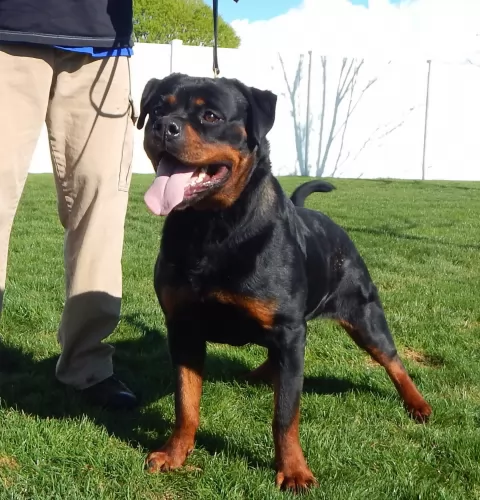 They are friendly with children and enjoy the company with them. But it is not advised to leave them with children without adult supervision.
They are friendly with children and enjoy the company with them. But it is not advised to leave them with children without adult supervision.
Rottweilers do not make friends immediately but take time to know about new people. He is an excellent watchdog. Males are quiet in nature but are watchful and females are more affectionate and obey some more. A good training is required for them to obey your orders.
They are not good for apartment life and thus a fenced back yard will be better for them to play and spend the energy. They require companion and will be happy to walk around with you. Hot weather will be some what better for them when compared with cold.
Rottweilers are easy to train because of their high intelligence. The training should be started in their young stage to have best results. They should not be dominated but treated kindly with understanding. They should be comfortable with the surroundings and people. Giving him a reward for training will make him interested in doing it. If he does a mistake then he should not be hit, so that he may get fear and loss his interest in doing it. Punishments will never work for them but rewarding will make him encouraged. Simple commands such as sit and stand shall be taught to them.
 As an intelligent hunting dog, the German Shorthaired Pointer is also a loving family companion and he just loves spending time outdoors with his human family.
As an intelligent hunting dog, the German Shorthaired Pointer is also a loving family companion and he just loves spending time outdoors with his human family.
He is pretty much an all-rounder – playful, energetic, a good watchdog and a loving and devoted family friend.
For an active, outdoor kind of family, include the German Shorthaired Pointer in all your activities and you’re going to ensure that you have a most wonderful 4-legged friend.
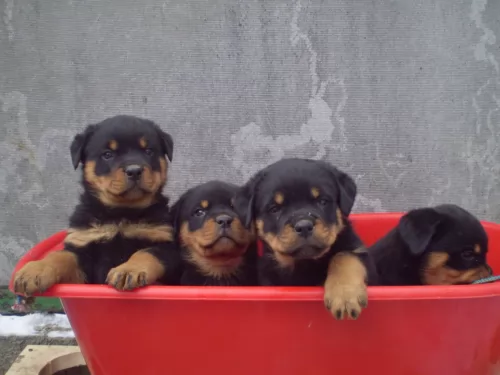 The health issues affecting the eyes of them are Cataract and Progressive Retinal Atropy. Health problems common in their joints are Hip Dysplasia, Elbow Dysplasia and Panosteitis. They also have chances to get circulatory system problems like Aortic Stenosis and Von Willebrand's Disease. Other common health problems in Rottweiler are Bloat and Cancer.
The health issues affecting the eyes of them are Cataract and Progressive Retinal Atropy. Health problems common in their joints are Hip Dysplasia, Elbow Dysplasia and Panosteitis. They also have chances to get circulatory system problems like Aortic Stenosis and Von Willebrand's Disease. Other common health problems in Rottweiler are Bloat and Cancer.
Mostly people think that Rottweilers don't shed but they are short haired dog and sheds more. They are having double coat that is undercoat and topcoat. The undercoat is softer and protects them in winter and topcoat is rougher and visible. It is said that they will shed in spring and winter seasons. Shedding can be reduced by brushing them.
 Most German Shorthaired Pointers are healthy dogs, but even so, just like with any other dog breed, they can be subject to some hereditary disorders as well as some of the other common dog illnesses there are -
Most German Shorthaired Pointers are healthy dogs, but even so, just like with any other dog breed, they can be subject to some hereditary disorders as well as some of the other common dog illnesses there are -
Dogs are such devoted family members that you just want to give in to them and pop the chocolate treats you love into their mouths. But dog’s can’t eat chocolate! Just one piece can affect a small dog. Symptoms of chocolate poisoning include diarrhea,vomiting, panting and shaking and even worse, a heart attack. If your dog has got hold of some chocolate, get him to the vet immediately.
Your German Shorthaired Pointer, as a puppy, should have his puppy vaccines. If your dog has this terrible disease, he will be lethargic, have diarrhea and almost seem out of it. Survival isn’t always guaranteed and the best way to avoid this killer disease, is to ensure your puppies vaccinations are up to date.
Check your pet for Bloat or an enlarged stomach which can twist because of trapped gas. This can be deadly for your pet. Get him immediately to the vet. He’ll be restless, lethargic and trying to vomit.
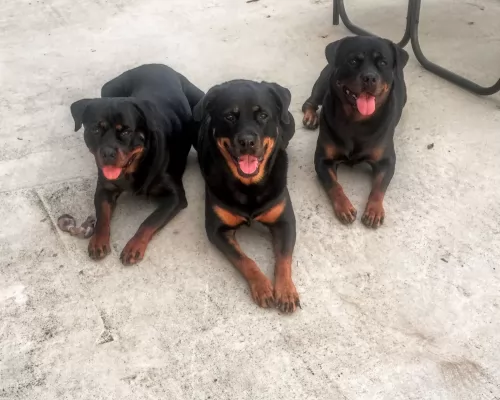 Rottweiler puppies should be given a diet which has protein, carbohydrates and fats. They need different diets in their growing stages. They can be given chicken with bones and vegetables for 4 days in a week. Beef with vegetables can also be given. When feeding them red meat a raw meaty bone can also be included. Fish oil can be given such that starting with 1000 mg and making it to 3000 mg in a time of two weeks.
Rottweiler puppies should be given a diet which has protein, carbohydrates and fats. They need different diets in their growing stages. They can be given chicken with bones and vegetables for 4 days in a week. Beef with vegetables can also be given. When feeding them red meat a raw meaty bone can also be included. Fish oil can be given such that starting with 1000 mg and making it to 3000 mg in a time of two weeks.
High calories of protein should be provided to them to meet their energy requirements. While buying commercial food it should be checked for the main ingredient to be meat. Protein levels should be more from animals than vegetables. High quality dairy products should be included. Food should not have low quality flavours and preservatives. Healthy fat is necessary for their skin and coat. If these fats are not provided it will cause dandruff and itchy skin.
Brushing them weekly once is recommended for their coat and skin. Buying the puppy from reputable breeder will be better. Vaccinations and preventive medicines should be given on right time. Spaying and Neutering should be done to avoid unwanted pregnancy. High quality diet should be maintained. Making them to bath once in a week is advisable. Nails should be trimmed once in every two weeks.
Rottweilers like to chase something and Laser pointer will be a good game for them. It will make them busy and also entertain us. But it should be on a limit and they should not get bored. A treat or toy can be hided and they can be made to find it. A bottle should be filled with water and frozen. The frozen bottle can be given to them for playing. In summer time it will make them very happy to play with it. A ball or toy can be thrown and they can be made to fetch it. Walking them is also a good exercise.
 The German Shorthaired Pointer isn’t a heavy shedder. He has a short coat which requires brushing at least twice a week to remove loose hairs and keep it shiny and sleek.
The German Shorthaired Pointer isn’t a heavy shedder. He has a short coat which requires brushing at least twice a week to remove loose hairs and keep it shiny and sleek.
Also check in- and outside the ears, clip his nails and brush his teeth 2 or 3 times a week.
Only the highest grade kibble will do. Mix in some of your own home-made cooked brown rice, vegetables and chicken from time to time and also ensure your pet gets in some raw meat as well. Cool, fresh water should be constantly available.